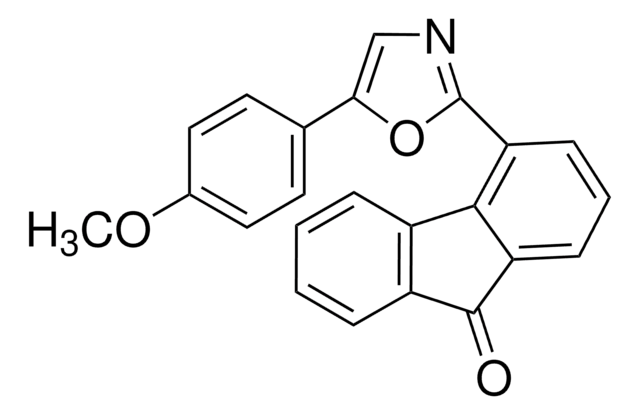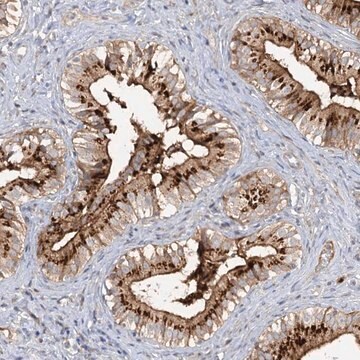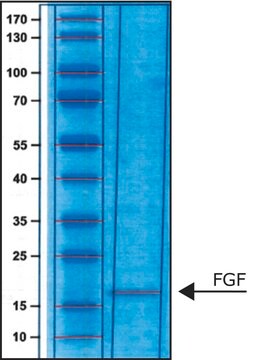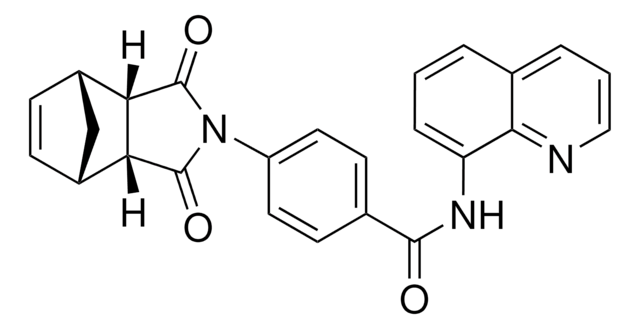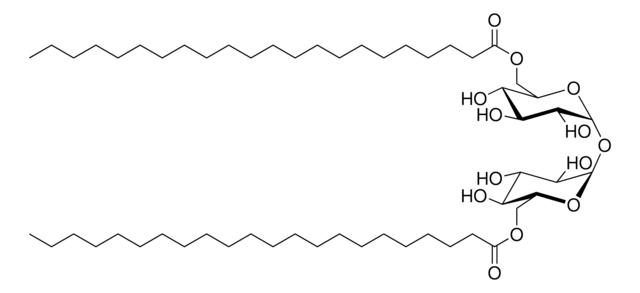Wszystkie zdjęcia(1)
Kluczowe dokumenty
RAB0540
Human FGF19 / Fibroblast Growth Factor 19 ELISA Kit
for serum, plasma, cell culture supernatants and urine
Zaloguj sięWyświetlanie cen organizacyjnych i kontraktowych
About This Item
Kod UNSPSC:
41116158
NACRES:
NA.32
Polecane produkty
reaktywność gatunkowa
human
opakowanie
kit of 96 wells (12 strips x 8 wells)
metody
ELISA: suitable
moc wejściowa
sample type urine
sample type plasma
sample type cell culture supernatant(s)
sample type serum
assay range
inter-assay cv: <10%
intra-assay cv: <12%
sensitivity: 30 pg/mL
metoda wykrywania
colorimetric
Warunki transportu
wet ice
temp. przechowywania
−20°C
informacje o genach
human ... FGF19(9965)
Powiązane kategorie
Opis ogólny
This ELISA antibody pair detects human Fibroblast Growth Factor 19.
Zastosowanie
For research use only. Not for use in diagnostic procedures.
Please refer to the attached General ELISA KIT Procedure (sandwich, competitive & Indirect ELISA)
Please refer to the attached General ELISA KIT Procedure (sandwich, competitive & Indirect ELISA)
Działania biochem./fizjol.
Fibroblast growth factor (FGF) 19 controls bile acid, fatty acid, glucose and phosphate metabolism in target organs by activating FGF receptor 4. FGF19 regulates hepatic protein and glycogen metabolism via activation of insulin-independent endocrine pathway. In diabetic mice, FGF19 reduces the levels of serum glucose and triglycerides. Overexpression of the gene leads to the development of hepatocellular carcinoma (HCC).
Inne uwagi
A sample Certificate of Analysis is available for this product.
Please type the word sample in the text box provided for lot number.
Please type the word sample in the text box provided for lot number.
Ta strona może zawierać tekst przetłumaczony maszynowo.
Elementy zestawu są też dostępne oddzielnie
Numer produktu
Opis
Karta charakterystyki
- RABTMB3ELISA Colorimetric TMB Reagent (HRP Substrate, Item H)Karta charakterystyki
- RABSTOP3ELISA Stop Solution (Item I)Karta charakterystyki
- RABELADBELISA 5X Assay/Sample Diluent Buffer B (Item E1)Karta charakterystyki
- RABELADCELISA 1X Assay/Sample Diluent Buffer C (Item L)Karta charakterystyki
- RABWASH420X Wash Buffer (Item B)Karta charakterystyki
Hasło ostrzegawcze
Warning
Zwroty wskazujące rodzaj zagrożenia
Zwroty wskazujące środki ostrożności
Klasyfikacja zagrożeń
Met. Corr. 1
Kod klasy składowania
8A - Combustible corrosive hazardous materials
Temperatura zapłonu (°F)
Not applicable
Temperatura zapłonu (°C)
Not applicable
Wybierz jedną z najnowszych wersji:
Masz już ten produkt?
Dokumenty związane z niedawno zakupionymi produktami zostały zamieszczone w Bibliotece dokumentów.
Christian Borup et al.
The American journal of gastroenterology, 115(12), 2086-2094 (2020-08-03)
The diagnosis of bile acid diarrhea is often missed because the availability of the seleno-taurohomocholic acid (SeHCAT) test is limited. We aimed to compare the biomarkers 7α-hydroxy-4-cholesten-3-one (C4) and fibroblast growth factor 19 (FGF19) with the SeHCAT test. Patients with
Lixia Gao et al.
Oncogene, 38(13), 2394-2404 (2018-12-07)
The fibroblast growth factor 19 gene FGF19 has previously been reported to be amplified in several cancer types and encodes for a key autocrine signaler known to promote tumorigenic growth. Thus, it is imperative to understand which cancers are oncogenically
Xiangdong Zhao et al.
Molecular carcinogenesis, 57(11), 1616-1625 (2018-08-04)
Although genetic amplification and overexpression of the fibroblast growth factor 19 (FGF19) gene are found in human breast cancer, mechanisms that contribute to such functional alterations remain elusive. We report here that high expression of FGF19 is associated with the
Aze Wilson et al.
Scientific reports, 10(1), 11725-11725 (2020-07-18)
The farnesoid X receptor (FXR) is implicated in Crohn's disease (CD) pathogenesis. It is unclear how genetic variation in FXR impacts CD severity versus genetic variation in nuclear receptors such as pregnane X receptor (PXR) and the multi-drug resistance protein
FGF19 as a Postprandial, Insulin-Independent Activator of Hepatic Protein and Glycogen Synthesis
Kir S, et al.
Science, 331(6024), 1621-1624 (2011)
Nasz zespół naukowców ma doświadczenie we wszystkich obszarach badań, w tym w naukach przyrodniczych, materiałoznawstwie, syntezie chemicznej, chromatografii, analityce i wielu innych dziedzinach.
Skontaktuj się z zespołem ds. pomocy technicznej
